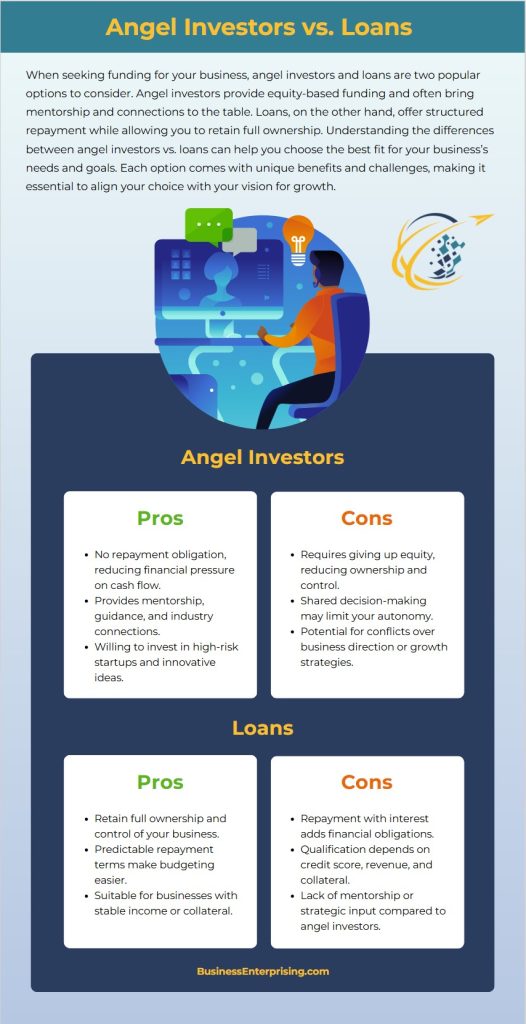 Securing funding is a critical step for growing your business. Two common options are angel investors and business loans. Each has unique advantages and potential challenges. Understanding the differences between angel investors vs. loans helps you make the best decision for your goals.
Securing funding is a critical step for growing your business. Two common options are angel investors and business loans. Each has unique advantages and potential challenges. Understanding the differences between angel investors vs. loans helps you make the best decision for your goals.
Angel investors provide equity funding and often bring mentorship and connections to the table. In contrast, loans require repayment but let you retain full ownership. Choosing between the two depends on your business stage, funding needs, and long-term priorities.
This guide will help you explore the key features of both options. By evaluating their pros, cons, and suitability, you can choose the right funding approach. Making an informed decision ensures you align your financing strategy with your business’s success.
Overview of Angel Investors and Loans
Angel investors and business loans are two common ways to secure funding for your business. Both offer unique approaches to financing. Understanding the differences between angel investors vs. loans is essential when deciding which suits your needs best.
Angel investors are individuals who provide financial backing in exchange for equity in your business. They often invest in startups or early-stage companies. Along with funding, they may offer guidance and access to their professional networks. This combination of capital and expertise can help accelerate your business’s growth.
Business loans, on the other hand, involve borrowing money from banks or financial institutions. Loans typically require repayment with interest over a fixed period. Unlike angel investors, loans do not involve giving up any ownership in your business. However, you must meet certain criteria, such as good credit and a detailed business plan, to qualify.
Both options come with their advantages and challenges. Angel investors focus on potential, often taking risks on new ideas. Loans, meanwhile, rely on your ability to repay, making them more suitable for businesses with stable income. Comparing angel investors vs. loans helps you assess which aligns with your goals and circumstances. Choosing the right funding source can make a significant impact on your business’s success.
Pros and Cons of Angel Investors
Angel investors offer unique benefits that can greatly support your business. They provide funding without the need for repayment, unlike traditional loans. This allows you to focus on growth without worrying about monthly payments. Additionally, angel investors often bring valuable mentorship and expertise, helping you make informed decisions and avoid common pitfalls.
Another advantage of working with angel investors is their willingness to take risks. They often invest in early-stage businesses or startups that may not qualify for loans. Beyond funding, they may open doors to networking opportunities, connecting you with potential clients, partners, or future investors.
However, there are also challenges to consider when comparing angel investors vs. loans. One major drawback is the equity you give up in your business. This means sharing ownership and, in some cases, decision-making power. Over time, this can impact your control over the direction of your company.
Choosing angel investors requires careful consideration of your long-term goals. While the guidance and funding they offer are invaluable, you must weigh the cost of equity sharing. Evaluating these pros and cons will help you determine if angel investment aligns with your business vision and needs.
Pros and Cons of Business Loans
Business loans provide a structured way to finance your business while retaining complete ownership. Unlike angel investors, loans do not require equity sharing. This means you maintain full control over decisions and the future direction of your company. Fixed repayment terms also offer predictability, allowing you to budget effectively for monthly payments.
Another advantage of business loans is their flexibility in usage. You can allocate funds toward various needs, such as purchasing equipment or expanding operations. Loans often come with lower interest rates than alternative financing methods, especially if you have a strong credit history. When comparing angel investors vs. loans, the ability to keep ownership makes loans appealing for many entrepreneurs.
However, there are potential drawbacks to consider. Business loans typically require eligibility criteria, such as a good credit score or collateral. Meeting these requirements can be challenging for startups or businesses with limited financial history. Additionally, interest rates add to the overall cost, making long-term repayment more expensive than the original loan amount.
Choosing a business loan involves balancing its benefits and challenges. While it lets you maintain ownership, repayment obligations can be demanding. Evaluating your financial stability and future revenue potential can help you decide if a loan is the right choice for your business.
Key Differences Between Angel Investors and Loans
Angel investors and loans differ significantly in how they provide funding and their long-term impact on your business. One key difference is the nature of repayment. Loans require fixed repayments with interest, while angel investors do not require repayment. Instead, they gain equity in your business, which can impact your decision-making authority.
Funding size is another important distinction between angel investors vs. loans. Angel investors typically provide larger amounts for startups or high-growth companies. Loans, however, are often tied to your financial history or collateral and may have more limited amounts. This makes loans more suitable for established businesses with predictable revenue.
Decision-making control also varies greatly. Angel investors often become equity partners, which can lead to shared decision-making. While this partnership may bring expertise, it reduces your full control over the business. With loans, you retain complete ownership, ensuring all business decisions remain in your hands.
These differences highlight the need to align funding methods with your business goals. Comparing factors like repayment, funding size, and decision-making control can help you decide which option is right. Whether you prioritize maintaining ownership or securing strategic guidance, understanding angel investors vs. loans is key to making an informed choice.
When to Choose Angel Investors
Angel investors are often the right choice when your business needs more than just funding. They provide equity-based investments along with mentorship and industry connections. This combination of capital and strategic guidance can be essential for startups aiming to scale quickly or enter competitive markets.
You might choose angel investors when your business is in its early stages and lacks the collateral or financial history to secure a loan. Angel investors take calculated risks and often back innovative ideas that traditional lenders might not consider. Their willingness to invest in potential rather than immediate returns makes them a valuable resource for emerging businesses.
Another reason to work with angel investors is the opportunity to form strategic partnerships. Many bring extensive networks and expertise that can open doors to new clients, partnerships, or markets. This is particularly beneficial for businesses operating in industries that rely heavily on connections or market influence.
When comparing angel investors vs. loans, equity funding becomes more appealing if your business values strategic input over retaining full ownership. While you share decision-making power, the guidance and resources angel investors offer can outweigh this trade-off. If your goal is rapid growth and access to mentorship, angel investors are often the ideal choice.
When to Opt for Business Loans
Business loans are a smart choice when you want to retain full ownership of your business. Unlike angel investors, loans provide funding without requiring equity. This allows you to maintain control over decisions and keep future profits entirely within your business.
Loans are ideal for businesses with predictable revenue streams or established financial history. If you need funding to expand operations, purchase equipment, or cover short-term costs, a loan provides structured repayment terms. This predictability makes it easier to manage your finances and plan for long-term growth.
Another advantage of loans is their suitability for businesses that do not need strategic input from investors. If you have a clear vision and access to the expertise you need, a loan can help fund your goals without outside involvement. Comparing angel investors vs. loans, loans are better suited when ownership and independence are your priorities.
You might also opt for a loan when your funding needs are specific and finite. Loans are structured for defined purposes, making them practical for projects with clear budgets and timelines. This approach minimizes the financial impact while supporting your growth in a manageable way. For businesses seeking autonomy and structure, loans provide a reliable solution.
Conclusion
Choosing between angel investors vs. loans depends on your business needs and long-term goals. Each option has distinct advantages and challenges. Angel investors offer funding and mentorship but require equity, which impacts ownership. Loans provide structured repayment and retain your independence but add financial obligations.
When deciding, consider factors such as your funding amount, need for guidance, and willingness to share decision-making. Angel investors may suit startups seeking strategic partnerships, while loans are better for established businesses prioritizing ownership. Understanding these differences helps you align your choice with your vision.
Both options can support growth, but the right fit depends on your priorities. By weighing the pros and cons, you can make an informed decision that strengthens your business. Whether you choose equity funding or debt financing, ensure the approach aligns with your future plans.



